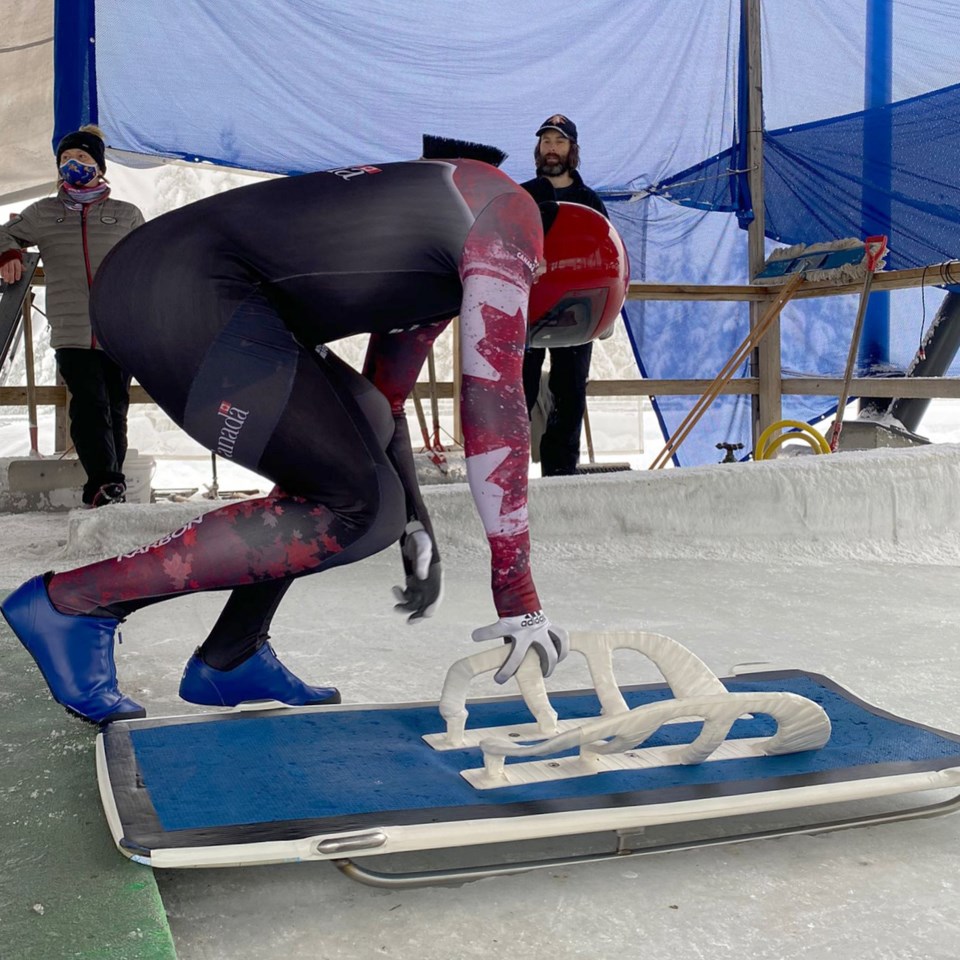Two years ago, highly ranked Canadian skeleton racer Evan Neufeldt made the decision to walk away from the sport at just 32 years old when he started getting chronic long-lasting headaches on a regular basis.
After seeing a neurologist and getting multiple tests done, the results came back with news that Neufeldt had epilepsy.
“Pretty brutal finding out. Pretty tough realization there,” he said.
“I don’t want to say that I accepted it gracefully, but now it has really changed my outlook on life where I recognize some of the things I used to be stressed about, or some of the things I used to complain about were so irrelevant.”
To make matters worse for the Saskatoon native, during one of his hospital stays in the spring of 2020, Neufeldt suffered another seizure that resulted in him falling out of bed and breaking his neck, which caused some nerve damage in his right arm, potentially spelling an end to his skeleton career and life as an athlete in general.
“I spent the summer rehabilitating like it was my job. I’m grateful for all my sporting background because really, it’s everything from nutrition to exercise,” said Neufeldt.
“I healed my neck so fast. I was determined; I was on a mission sort of thing. I did have some brutal side effects, so there was a little bit of luck to have a solid recovery because I have talked to a lot of people with spinal injuries and not everybody comes out of it the way they went in. There are often permanent, lasting effects.”
Just five months after breaking his neck, fully recovered and feeling as strong and healthy as ever, Neufeldt received a text from a former coach asking him if he’d like to come out and try skeleton again.
And while he believed that stepping away from the sport was the right decision at the time due to burnout and the high cost of the sport, it didn’t take long for him to realize how much he missed it.
“I talked to my neurologist and my psychiatrist, and everyone agreed that there was no real reason [I couldn’t] go back. [They said] epilepsy is not stopping you from sliding. If your seizures are under control, then you can go play, essentially. So I gave it a try last year, very experimental, but I felt at home,” said Neufeldt.
“If anything, I’m addicted to this sport. It’s a combination of things. The speed is fantastic. When things are going right here in Whistler, Whistler is the fastest track. I mean we’re an inch off the ground, but it really feels like we are flying. Gravity is relative when you are going through a corner at 140 kilometres per hour. It’s hard to describe how freeing this feels.”
This past weekend, a year after getting back into the sport on a trial basis, Neufeldt won the Canadian Skeleton selection race on Whistler’s sliding track to earn his spot back on team Canada.
However, since he doesn’t have the prerequisites to qualify for the World Cup Circuit—five races on three tracks over two years—Neufeldt will have to start the season on the lower level circuits before hopefully being bumped up to the World Cup later this season.
But starting on the lower circuits doesn’t change much in the way of Neufeldt’s goals for this season as he is “gunning hard for the Olympics,” and believes he’s got as good of a chance as anybody to make that goal a reality.
“The Olympics are going to be a chosen few based on the season and really from my perspective it is 50-50 whether I’ll be going, but there are no strong components working against me. I am one of the fastest starters in the country, and I’m one of the best pilots in the country,” said Neufeldt.
“I just need to have a smooth season. Right now, physically I am feeling fantastic, I feel like I am in my 20s again. We’ve got some great athletes in Canada, but I feel confident about it.”
Three or four years ago, the Olympics might have been the only end goal for Neufeldt, but since his time away, his rediscovery of his love for the sport and his new work as an ambassador for Epilepsy Canada, that’s not the case anymore. Now, he’s committed to five more seasons of sliding, and just wants to show others with epilepsy that they can still follow their dreams, Olympics or not.
“Ultimately, whether or not I make the Olympics, I want to show other epileptics that I’m competing at the top level of this sport, disability or not,” he said.
“Everybody’s life is different; I wouldn’t trade any of my problems for someone else’s. So I feel like I can be a strong representative for others who are dealing with the same issues that I’ve got. Woking with Epilepsy Canada has given me a whole new piece of the puzzle where I am proud to be working for them, and as much as I’m still a selfish athlete, there is a larger picture at play that I’m trying to show off.”




